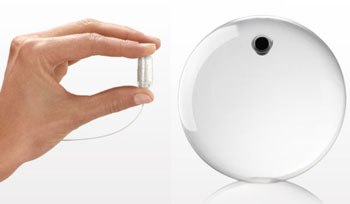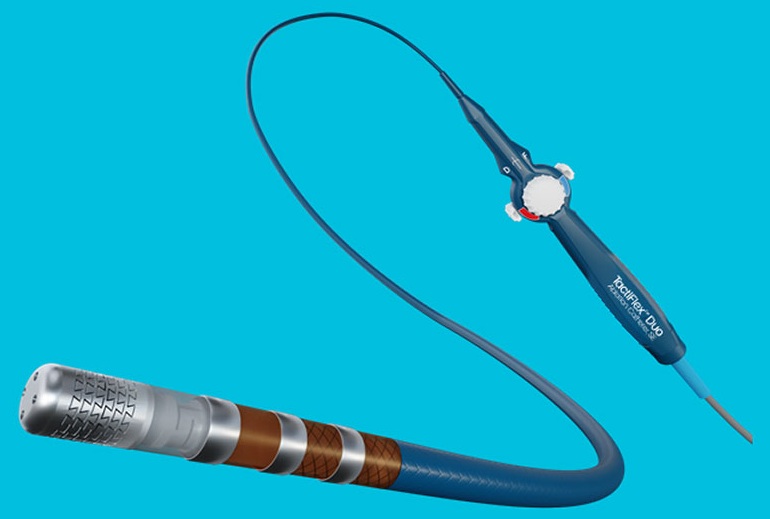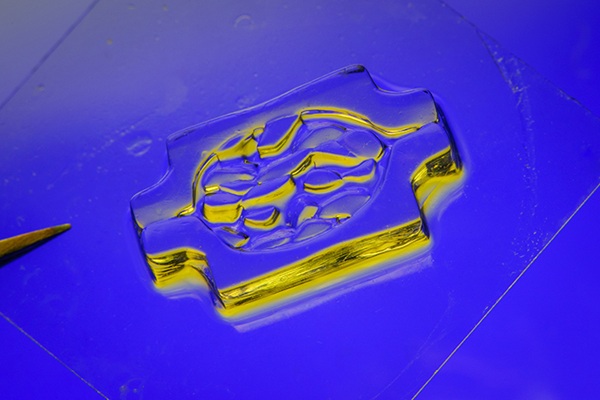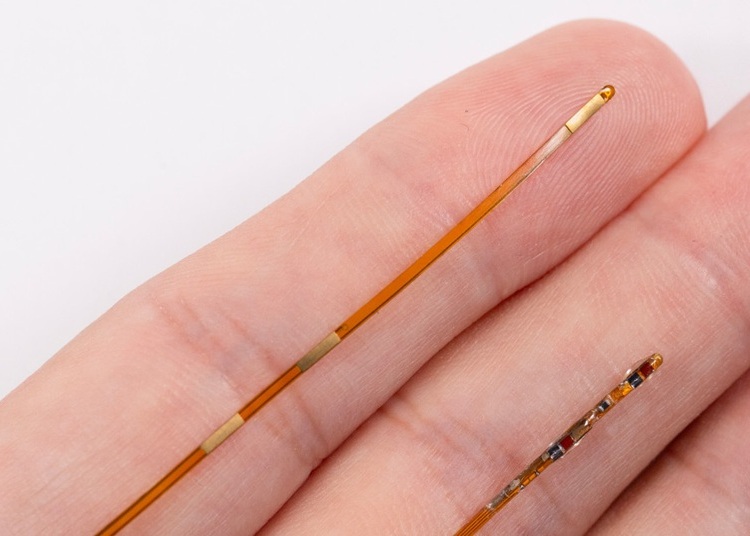Ingestible Balloon Helps Patients Lose Weight
|
By HospiMedica International staff writers Posted on 04 Oct 2016 |

Image: An ingestible intragastric balloon system helps reduce weight (Photo courtesy of Obalon).
An ingestible intragastric balloon system facilitates weight loss in obese adults who failed to lose weight through diet and exercise.
The Obalon system consists of a balloon folded inside a capsule that is swallowed by the patient, with no sedation or anesthesia required. Once the balloon reaches the stomach, it is remotely inflated via an attached micro-catheter that is subsequently removed, leaving behind a buoyant balloon with a volume of 250cc (about the size of a small orange) that weighs less than six grams. Over the following three months of treatment, two additional balloons are swallowed and inflated, bringing the total maximum displaced volume to750cc.
The nonsurgical weight loss system is fully reversible throughout the course, and at the end of the six-month treatment period, all three balloons are mandatorily removed via endoscopy under conscious sedation. The system is intended for use as an adjunct to a moderate intensity diet and to a behavior modification program. The Obalon balloon system is a product of Obalon (Carlsbad, CA, USA), and has been approved by the U.S. Food and Drug Administration (FDA).
“We’re excited to bring this novel technology to the approximately 70 million adults in the United States who are struggling with obesity. For physicians, we believe that the Obalon technology represents an important new option for both their practices and their patients who are obese and looking to lose weight,” said Andy Rasdal, CEO of Obalon. “I’d also like to recognize the FDA for their efficient and interactive review of our product, which represents another option for physicians and patients in the battle against the obesity epidemic.”
“The clinical trial design for the Obalon balloon system was highly rigorous and the system demonstrated a favorable safety profile,” said Shelby Sullivan, MD, director of the gastroenterology bariatric and metabolic program at the University of Colorado School of Medicine (Aurora, USA). “We were also pleased to see that patients tolerated the administrations of the Obalon balloon remarkably well, with no recovery time needed. This is in contrast to other currently approved intragastric balloon devices, where most patients cannot immediately return to normal activities.”
Related Links:
Obalon
The Obalon system consists of a balloon folded inside a capsule that is swallowed by the patient, with no sedation or anesthesia required. Once the balloon reaches the stomach, it is remotely inflated via an attached micro-catheter that is subsequently removed, leaving behind a buoyant balloon with a volume of 250cc (about the size of a small orange) that weighs less than six grams. Over the following three months of treatment, two additional balloons are swallowed and inflated, bringing the total maximum displaced volume to750cc.
The nonsurgical weight loss system is fully reversible throughout the course, and at the end of the six-month treatment period, all three balloons are mandatorily removed via endoscopy under conscious sedation. The system is intended for use as an adjunct to a moderate intensity diet and to a behavior modification program. The Obalon balloon system is a product of Obalon (Carlsbad, CA, USA), and has been approved by the U.S. Food and Drug Administration (FDA).
“We’re excited to bring this novel technology to the approximately 70 million adults in the United States who are struggling with obesity. For physicians, we believe that the Obalon technology represents an important new option for both their practices and their patients who are obese and looking to lose weight,” said Andy Rasdal, CEO of Obalon. “I’d also like to recognize the FDA for their efficient and interactive review of our product, which represents another option for physicians and patients in the battle against the obesity epidemic.”
“The clinical trial design for the Obalon balloon system was highly rigorous and the system demonstrated a favorable safety profile,” said Shelby Sullivan, MD, director of the gastroenterology bariatric and metabolic program at the University of Colorado School of Medicine (Aurora, USA). “We were also pleased to see that patients tolerated the administrations of the Obalon balloon remarkably well, with no recovery time needed. This is in contrast to other currently approved intragastric balloon devices, where most patients cannot immediately return to normal activities.”
Related Links:
Obalon
Latest Critical Care News
- New Nanomaterial Kills Cancer Cells While Sparring Healthy Tissues
- AI Model Accurately Predicts Neurological Recovery After Cardiac Arrest
- Battery-Free Nano-Sensors Pave Way for Next-Generation Wearables
- Imaging Technology Detects Early Signs of Cardiovascular Risk Through Skin
- New Therapeutic Approach Marks Breakthrough in Pediatric Heart Disease
- AI Model Accurately Identifies Prediabetics Using Only ECG Data
- Injectable Disease-Fighting Nanorobots to Improve Precision Cancer Therapy
- Web-Based Tool Enables Early Detection and Prevention of Chronic Kidney Disease
- Tiny Sensor to Transform Head Injury Detection
- Bacterial Behavior Breakthrough to Improve Infection Prevention in Biomedical Devices
- Implanted 'Living Skin' Indicates Internal Inflammation Without Blood Samples
- AI Tool Improves Speed and Accuracy of Cervical Cancer Treatment Planning
- Ultrasonic Sensor Enables Cuffless and Non-Invasive Blood Pressure Measurement
- Simple Change in Sepsis Treatment Could Save Thousands of Lives
- AI-Powered ECG Analysis Enables Early COPD Detection
- Soft Wireless Implant Treats Inflammatory Bowel Disease
Channels
Artificial Intelligence
view channelSurgical Techniques
view channel
New AI Approach to Improve Surgical Imaging
Surgeons often rely on visual judgment to distinguish between healthy and diseased tissue or to avoid damaging critical structures during procedures. This assessment is subjective and limited by what the... Read more
Dual-Energy Catheter Brings New Flexibility to AFib Ablation
Abbott has secured CE Mark approval for the TactiFlex Duo Ablation Catheter, Sensor-Enabled, for the treatment of atrial fibrillation (AFib). AFib is a common and progressive cardiac arrhythmia affecting... Read morePatient Care
view channel
Revolutionary Automatic IV-Line Flushing Device to Enhance Infusion Care
More than 80% of in-hospital patients receive intravenous (IV) therapy. Every dose of IV medicine delivered in a small volume (<250 mL) infusion bag should be followed by subsequent flushing to ensure... Read more
VR Training Tool Combats Contamination of Portable Medical Equipment
Healthcare-associated infections (HAIs) impact one in every 31 patients, cause nearly 100,000 deaths each year, and cost USD 28.4 billion in direct medical expenses. Notably, up to 75% of these infections... Read more
Portable Biosensor Platform to Reduce Hospital-Acquired Infections
Approximately 4 million patients in the European Union acquire healthcare-associated infections (HAIs) or nosocomial infections each year, with around 37,000 deaths directly resulting from these infections,... Read moreFirst-Of-Its-Kind Portable Germicidal Light Technology Disinfects High-Touch Clinical Surfaces in Seconds
Reducing healthcare-acquired infections (HAIs) remains a pressing issue within global healthcare systems. In the United States alone, 1.7 million patients contract HAIs annually, leading to approximately... Read moreHealth IT
view channel
EMR-Based Tool Predicts Graft Failure After Kidney Transplant
Kidney transplantation offers patients with end-stage kidney disease longer survival and better quality of life than dialysis, yet graft failure remains a major challenge. Although a successful transplant... Read more
Printable Molecule-Selective Nanoparticles Enable Mass Production of Wearable Biosensors
The future of medicine is likely to focus on the personalization of healthcare—understanding exactly what an individual requires and delivering the appropriate combination of nutrients, metabolites, and... Read moreBusiness
view channel
WHX in Dubai (formerly Arab Health) to debut specialised Biotech & Life Sciences Zone as sector growth accelerates globally
World Health Expo (WHX) in Dubai, formerly Arab Health, which takes place from 9-12 February 2026 at the Dubai Exhibition Centre (DEC), has officially announced the launch of a new dedicated Biotech &... Read more
WHX in Dubai (formerly Arab Health) to bring together key UAE government entities during the groundbreaking 2026 edition
World Health Expo (WHX), formerly Arab Health, will bring together the UAE’s health authorities and leading healthcare sector bodies when the exhibition debuts at the Dubai Exhibition Centre (DEC) from... Read more
Interoperability Push Fuels Surge in Healthcare IT Market
Hospitals still struggle to reconcile data scattered across electronic health records, laboratory systems, and billing platforms, undermining care coordination and operational efficiency.... Read more
















